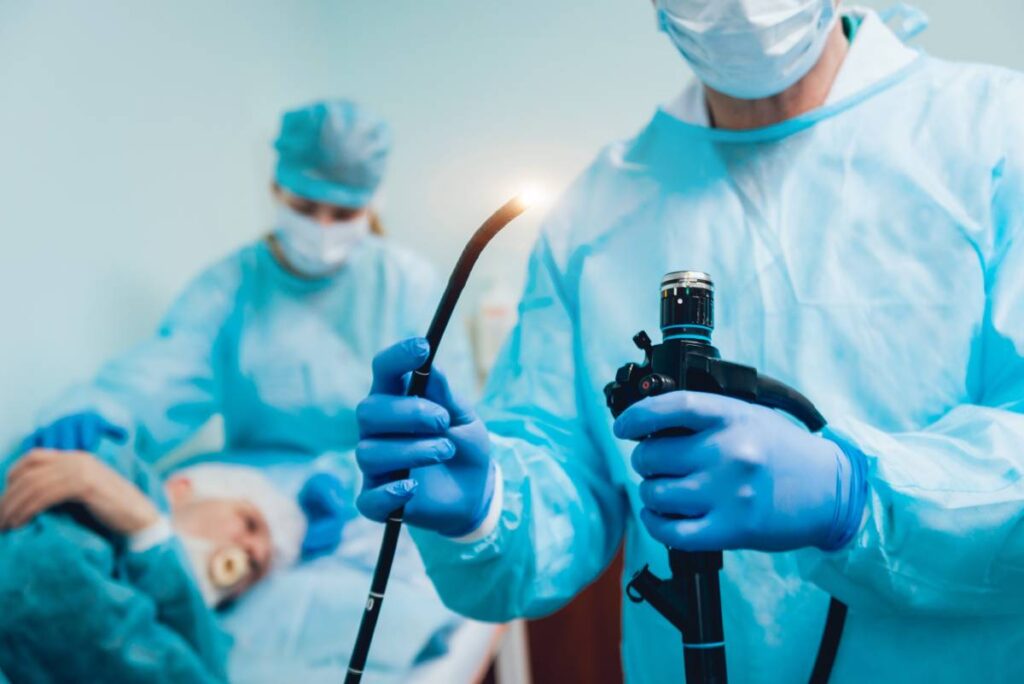Patient preparation plays a crucial role in the success and safety of both esophagogastroduodenoscopy (EGD) and colonoscopy procedures. While these gastrointestinal endoscopic procedures serve distinct purposes, they share some similarities in pre-procedure preparation.
An esophagogastroduodenoscopy (EGD) is a procedure used to examine the upper gastrointestinal tract, including the esophagus, stomach, and duodenum. It is commonly performed to diagnose and treat conditions such as gastroesophageal reflux disease, ulcers, and Barrett’s esophagus 1. In contrast, a colonoscopy is a procedure used to examine the large intestine (colon) and rectum. It is primarily used for screening and diagnosing conditions such as colorectal cancer, inflammatory bowel disease, and polyps 2.
Patients undergoing EGD are typically instructed to fast for a certain period before the procedure, usually 6 to 8 hours. Fasting helps ensure that the stomach is empty, allowing for better visualization during the examination. Fasting is also important if the procedure is being performed under anesthesia. Patients may need to adjust their medication regimen before EGD, especially if they are taking blood thinners or medications that affect stomach acid production. Before the procedure, patients should be sure to inform their healthcare provider about any medical conditions, allergies, or medications they are taking to help ensure the safety and effectiveness of the EGD procedure 3,4.
Patient preparation for colonoscopy differs somewhat from the process for EGD. Bowel preparation is critical. Patients are typically instructed to follow a special diet and drink a bowel-cleansing solution to empty the colon completely. Similar to EGD, patients undergoing colonoscopy are typically required to fast for a specified period before the procedure—fasting helps ensure that the colon is clear of any food particles, allowing for thorough examination. Finally, patients may need to adjust their medication regimen before colonoscopy, particularly if they are taking blood thinners or medications that affect bowel function; it is critical to follow the healthcare provider’s instructions regarding medication management 5,6.
While both the EGD and colonoscopy procedures require patients to fast and potentially adjust their medications, there are some key differences in preparation. Colonoscopy requires more extensive bowel preparation compared to EGD, including dietary restrictions and bowel-cleansing solutions to empty the colon adequately. Critically, too, the scope used in EGD is inserted through the mouth, while the scope used in colonoscopy is inserted through the rectum. As a result, the preparation for colonoscopy focuses more on ensuring a clear colon for scope insertion and examination 7,8.
Patient preparation is essential for the success and safety of both EGD and colonoscopy procedures. While there are similarities in preparation, such as fasting and medication adjustment, there are also distinct differences, particularly regarding bowel preparation. By understanding and adhering to the specific preparation instructions provided by their healthcare providers, patients can help ensure a smooth and effective examination process, ultimately leading to accurate diagnosis and appropriate treatment of gastrointestinal conditions.
References
1. Cilley, R. E. & Dillon, P. W. Esophagogastroduodenoscopy. Oper. Pediatr. Surg. Sixth Ed. 357–365 (2023). doi:10.1201/b13237-50
2. Colonoscopy: Prep & Procedure Details. Available at: https://my.clevelandclinic.org/health/diagnostics/4949-colonoscopy. (Accessed: 9th April 2024)
3. Preparing for an Upper Endoscopy (EGD) | Stanford Health Care. Available at: https://stanfordhealthcare.org/medical-tests/e/egd/what-to-expect/before-procedure.html. (Accessed: 9th April 2024)
4. Upper endoscopy – How you prepare – Mayo Clinic. Available at: https://www.mayoclinic.org/tests-procedures/endoscopy/about/how-you-prepare/ppc-20395194. (Accessed: 9th April 2024)
5. Preparing For Your Colonoscopy | Kaiser Permanente. Available at: https://healthy.kaiserpermanente.org/washington/get-care/additional-services/gastroenterology/colon-prep. (Accessed: 9th April 2024)
6. Colonoscopy – Getting ready – NHS. Available at: https://www.nhs.uk/conditions/colonoscopy/getting-ready/. (Accessed: 9th April 2024)
7. Endoscopy vs Colonoscopy – What’s the Difference? Available at: https://www.gastroconsa.com/endoscopy-vs-colonoscopy-whats-the-difference/. (Accessed: 9th April 2024)
8. Australia, H. Upper GI endoscopy and colonoscopy. (2023).
